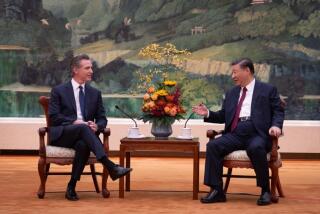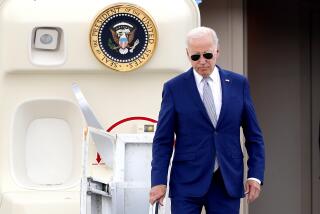Quayle Takes Harder Line on Sino-Soviet Ties
- Share via
Vice President Dan Quayle served notice Monday that the Bush Administration is adopting a cooler and more guarded approach to the prospect of a rapprochement between China and the Soviet Union.
As the vice president prepared to cross the Pacific on a 27,000-mile trip to Asia, he warned in a speech in Chicago that improved ties between China and the Soviet Union should not be carried out in a way that harms the United States or its Asian allies.
“We believe that a lessening of Sino-Soviet tensions is a logical course for both nations to pursue and have no objections to that, provided that any new relationship harms neither our own interests, nor those of our friends, and that it directly addresses our common security needs,” Quayle told the annual meeting of the Associated Press in Chicago.
He did not spell out what sorts of actions by China and the Soviet Union might be interpreted as harming U.S. interests.
Later Monday, during a stop here, Quayle visited former President Ronald Reagan’s Century City office and presented Reagan with the American flag taken from the U.S. Embassy in Afghanistan when it was closed in January because of the deteriorating military situation in Kabul.
Asked how he thought President Bush has done during his first three months, Reagan replied: “It’s been a long time since a Republican President succeeded a Republican President. . . . He is there to keep in progress the things we did together in the first eight years.”
U.S. Concern on Soviets
Quayle’s remarks in Chicago were less positive than previous U.S. assessments of the impact of warming relations between China and the Soviet Union. They appeared to reflect a continuing U.S. concern about what role the Soviet Union will play in Asia and whether its naval forces may threaten the region’s fast-growing economies.
“After all, the Soviets continue to modernize their force projection capabilities in Asia and the Pacific, where the largest of the Soviet fleets remains stationed,” Quayle observed.
Soviet President Mikhail S. Gorbachev and China’s paramount leader, Deng Xiaoping, are scheduled to hold a summit meeting in Beijing next month, the first one between the two countries’ leaders in more than three decades.
Over the past year, senior U.S. officials have asserted that a warmer relationship between Moscow and Beijing would be beneficial to the United States because it would reduce tensions in Asia.
On Monday, the vice president spoke of the upcoming Sino-Soviet summit in more cautious terms, avoiding any positive or optimistic characterizations. Quayle’s aides said this represents current Administration thinking.
Quayle suggested that the Soviet Union should not be permitted to have broader political and economic ties with the nations of East Asia until it takes further actions to restrain its two Asian allies, North Korea and Vietnam.
Quayle’s address in Chicago was the first stop in a 12-day trip in which he will visit Australia, Indonesia, Singapore and Thailand.
More to Read
Get the L.A. Times Politics newsletter
Deeply reported insights into legislation, politics and policy from Sacramento, Washington and beyond. In your inbox three times per week.
You may occasionally receive promotional content from the Los Angeles Times.










